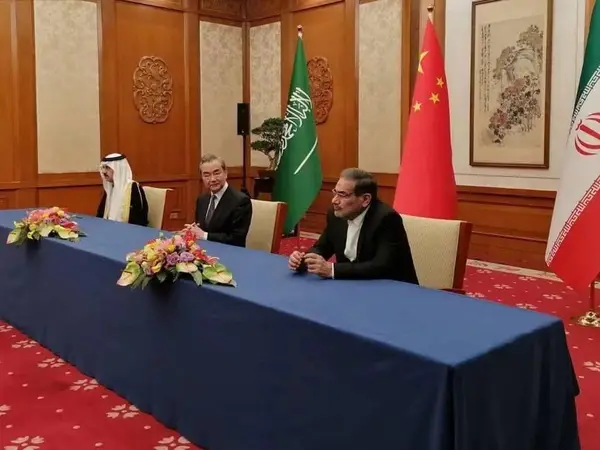Iran and Saudi Arabia have agreed to re-establish diplomatic ties after Chinese-mediated talks in Beijing.
Over five days of negotiations, it was agreed that the two countries will reinstate embassies and missions after seven years of deadlock.
Saudi Arabia severed relations with the Islamic Republic in January 2016 after pro-government Iranian mobs attacked and ransacked its embassy in Tehran and consulate in Mashhad following the execution of a Saudi Shiite cleric.
Relations remained tense as Iran expanded its influence in Arab countries with substantial Shiite populations and built up its proxy forces opposed to Saudi Arabia and supporting Iran’s regional policies.
The most crucial bilateral tension was with Yemen, where Iran supported Houthi rebels against the remnants of the country’s legal government, supported by Saudi led forces. However, a truce has been holding since last year.
The Secretary of Iran’s Supreme National Security Council, Ali Shamkhani, ‘the representative of the Supreme Leader’, Saudi Arabia’s national security advisor Musaad bin Mohammed Al Aiban and China’s Wang Yi, Director of the office of the Central Foreign Affairs Commission of the Chinese Communist Party, all signed the deal.
China’s role in mediating the detente amid serious Western tensions with Iran signals the elevation of its status as a Middle East power player. Beijing has good relations both with Riyadh and Tehran and its success this week will irk other parties such as Qatar which has long tried to position itself as the region’s negotiator.
Reinstating relations with the most powerful Persian Gulf nation will be seen as a huge boost to Iran which is facing serious economic problems due to the lack of a nuclear agreement with the West and US sanctions weighing heavily over its finances. This has been exacerbated since the recent protests which began in September.
Meanwhile, the revived relationship does not alleviate Saudi’s concerns for the regime’s continued expansion of its nuclear capacity. Saudi Arabia and the United States have allegedly been in talks to build Saudi’s own civilian nuclear program as fears around Iranian actions grow and even the Persian Gulf's most powerful nation seeks greater security reassurances from its allies.
In spite of tense relations between the Biden administration and Crown Prince Mohammed Bin Salman, the de facto ruler, Saudi Arabia also wants fewer restrictions on US arms sales, according to the New York Times.
People close to the talks say the US is leveraging the request to force Saudi’s hand to normalize relations with Israel, furthering the Trump-negotiated Abraham Accords which saw the United Arab Emirates, Bahrain and Morocco sign up to diplomatic ties with the Jewish state. Sudan has since joined.
Saudi has long said that formal diplomatic relations with Israel depend on a peaceful resolution to the Israel-Palestine conflict, though the two have been conducting business and security cooperation behind closed doors for some time. Saudi also opened its air space to Israel, in the wake of the Accords, signed in 2020.
However, as revelations of Iran’s growing capabilities continue and the JCPOA talks look no more likely to be revived after their collapse last year, the Kingdom is seeking other options. It is no simple process.
The US has no desire to give Saudi nuclear capabilities - Biden having already stated a desire to make the Kingdom a “pariah state” following the execution of Saudi journalist Jamal Khashoggi in the Saudi embassy in Istanbul in 2018. In spite of a visit last year, relations between the two countries remain tense.
Such a deal would no doubt be greatly challenged in Congress where several Democrats have voiced a desire to downgrade not increase relations with Saudi Arabia, where dozens of executions continue each year, without trial, and human rights are still widely violated, according to rights groups.
Without the assurances of a body such as NATO, agreements to arm Saudi could be a huge risk and possibly the end of the Biden administration.
Senator Christopher S. Murphy, Democrat of Connecticut and a member of the Foreign Relations Committee and a vehement campaigner to limit US arms sales to Saudi, told the New York Times: “If we’re going to enter into a relationship with the Saudis where we’re doing more significant arms sales, it should be in exchange for better behavior toward the United States, not just better behavior toward Israel.”
